Implementation of Sustainability in Construction Practices in UK
VerifiedAdded on 2022/12/14
|44
|13223
|226
Report
AI Summary
This dissertation proposal, titled "Implementation of sustainability in upcoming construction practices in United Kingdom," investigates the integration of sustainable practices within the UK construction industry. It begins with a background on the importance of sustainability and its link to productivity, highlighting the environmental impact of the construction sector and the need for change. The research aims to analyze the impact of sustainability on construction projects, identifying factors influencing sustainable performance, and exploring the relationship between productivity and sustainability. The study outlines specific research questions and objectives, including understanding the concept of sustainability, identifying key factors, and recommending ways for organizations to enhance their sustainability efforts and business growth. The methodology includes a detailed literature review, outlining research philosophy, approach, design, and strategy, alongside data collection methods and ethical considerations. The dissertation structure covers the introduction, literature review, research methodology, data analysis, and conclusion with recommendations, and reflection. The literature review explores the concept of sustainability in construction, its significance, and the factors affecting sustainable performance of construction projects. It also aims to analyze the ways to make construction activities more sustainable and enhance business growth.
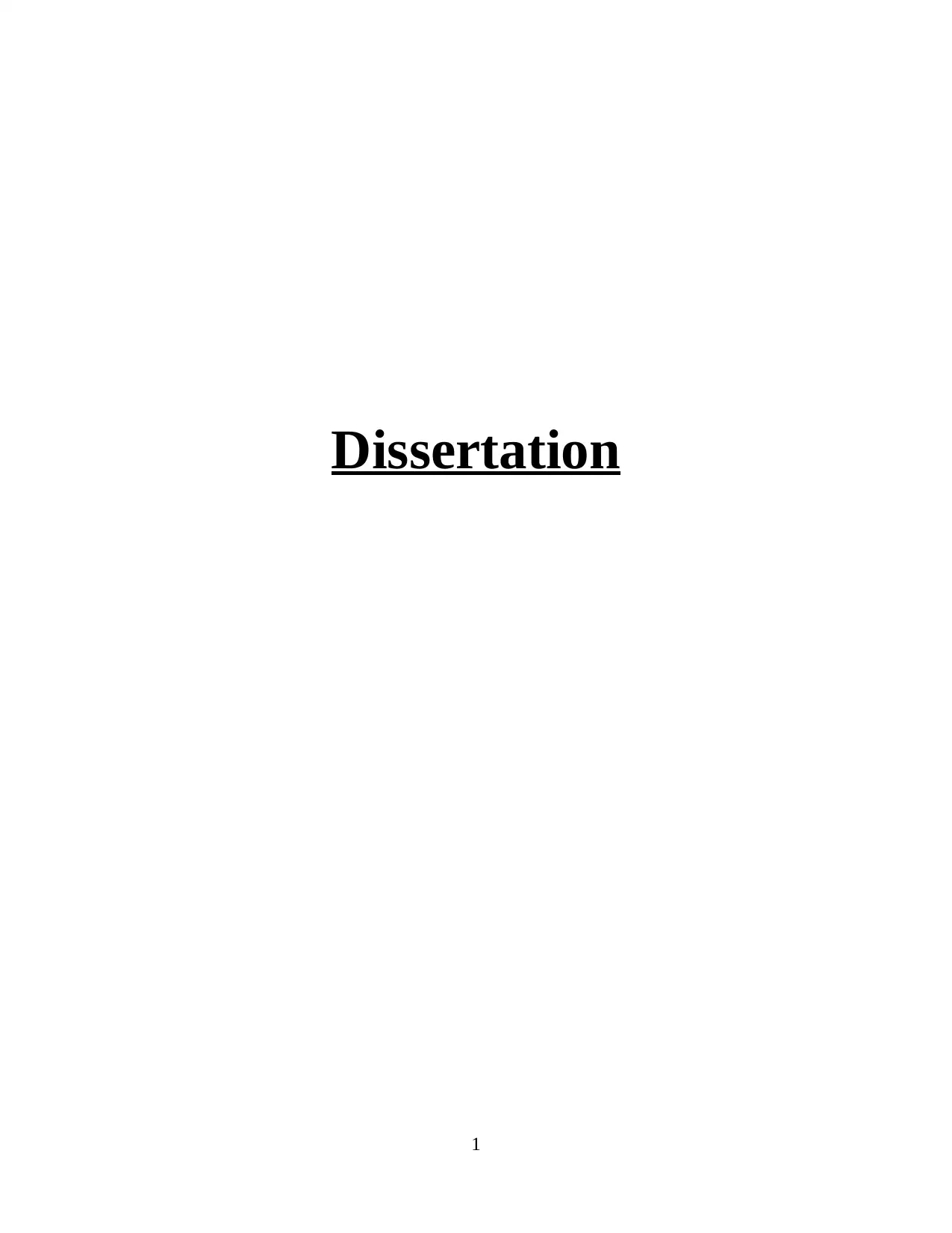
Dissertation
1
1
Paraphrase This Document
Need a fresh take? Get an instant paraphrase of this document with our AI Paraphraser
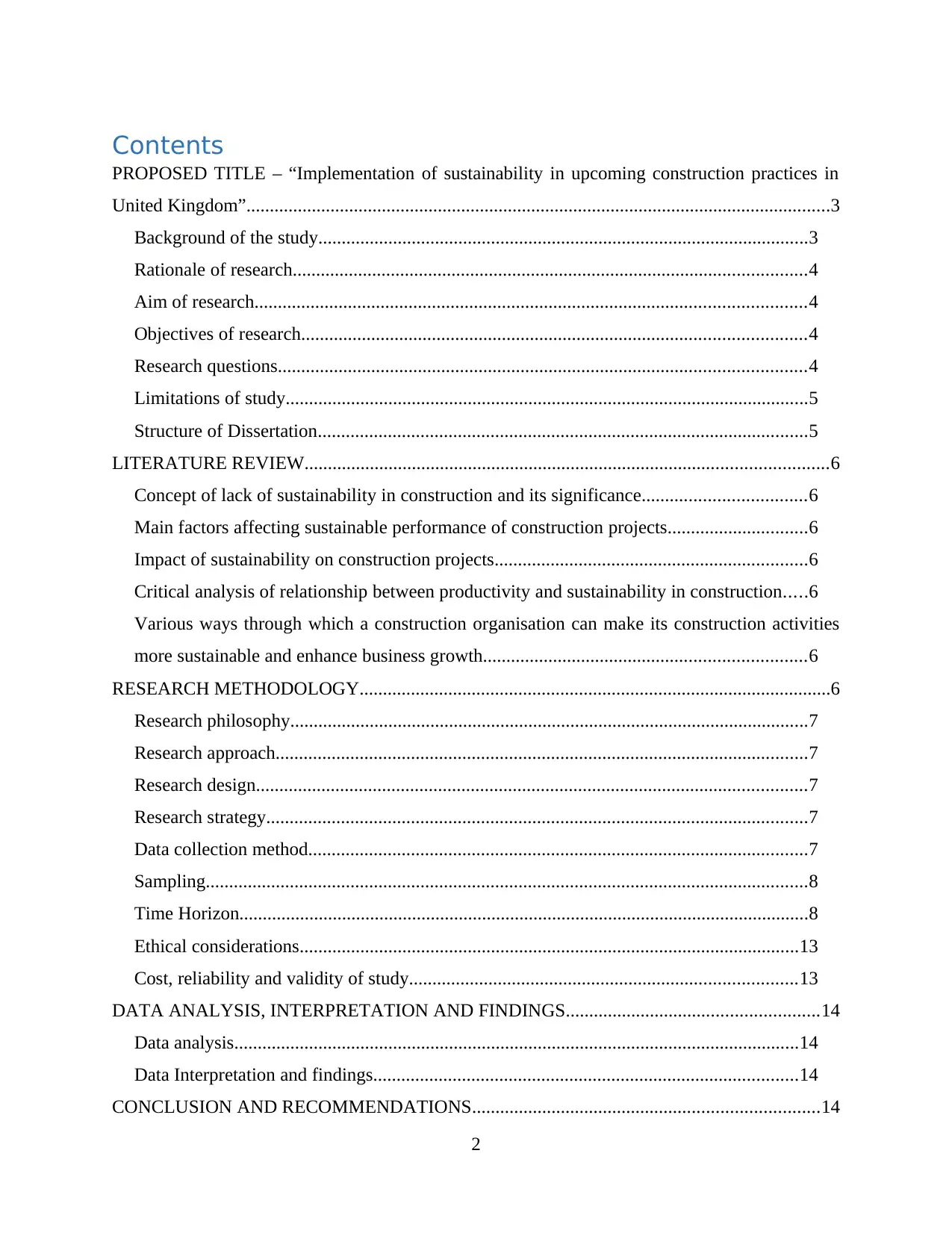
Contents
PROPOSED TITLE – “Implementation of sustainability in upcoming construction practices in
United Kingdom”.............................................................................................................................3
Background of the study.........................................................................................................3
Rationale of research..............................................................................................................4
Aim of research......................................................................................................................4
Objectives of research............................................................................................................4
Research questions.................................................................................................................4
Limitations of study................................................................................................................5
Structure of Dissertation.........................................................................................................5
LITERATURE REVIEW................................................................................................................6
Concept of lack of sustainability in construction and its significance...................................6
Main factors affecting sustainable performance of construction projects..............................6
Impact of sustainability on construction projects...................................................................6
Critical analysis of relationship between productivity and sustainability in construction.....6
Various ways through which a construction organisation can make its construction activities
more sustainable and enhance business growth.....................................................................6
RESEARCH METHODOLOGY.....................................................................................................6
Research philosophy...............................................................................................................7
Research approach..................................................................................................................7
Research design......................................................................................................................7
Research strategy....................................................................................................................7
Data collection method...........................................................................................................7
Sampling.................................................................................................................................8
Time Horizon..........................................................................................................................8
Ethical considerations...........................................................................................................13
Cost, reliability and validity of study...................................................................................13
DATA ANALYSIS, INTERPRETATION AND FINDINGS......................................................14
Data analysis.........................................................................................................................14
Data Interpretation and findings...........................................................................................14
CONCLUSION AND RECOMMENDATIONS..........................................................................14
2
PROPOSED TITLE – “Implementation of sustainability in upcoming construction practices in
United Kingdom”.............................................................................................................................3
Background of the study.........................................................................................................3
Rationale of research..............................................................................................................4
Aim of research......................................................................................................................4
Objectives of research............................................................................................................4
Research questions.................................................................................................................4
Limitations of study................................................................................................................5
Structure of Dissertation.........................................................................................................5
LITERATURE REVIEW................................................................................................................6
Concept of lack of sustainability in construction and its significance...................................6
Main factors affecting sustainable performance of construction projects..............................6
Impact of sustainability on construction projects...................................................................6
Critical analysis of relationship between productivity and sustainability in construction.....6
Various ways through which a construction organisation can make its construction activities
more sustainable and enhance business growth.....................................................................6
RESEARCH METHODOLOGY.....................................................................................................6
Research philosophy...............................................................................................................7
Research approach..................................................................................................................7
Research design......................................................................................................................7
Research strategy....................................................................................................................7
Data collection method...........................................................................................................7
Sampling.................................................................................................................................8
Time Horizon..........................................................................................................................8
Ethical considerations...........................................................................................................13
Cost, reliability and validity of study...................................................................................13
DATA ANALYSIS, INTERPRETATION AND FINDINGS......................................................14
Data analysis.........................................................................................................................14
Data Interpretation and findings...........................................................................................14
CONCLUSION AND RECOMMENDATIONS..........................................................................14
2

Conclusion............................................................................................................................14
Recommendations................................................................................................................14
3
Recommendations................................................................................................................14
3
⊘ This is a preview!⊘
Do you want full access?
Subscribe today to unlock all pages.

Trusted by 1+ million students worldwide
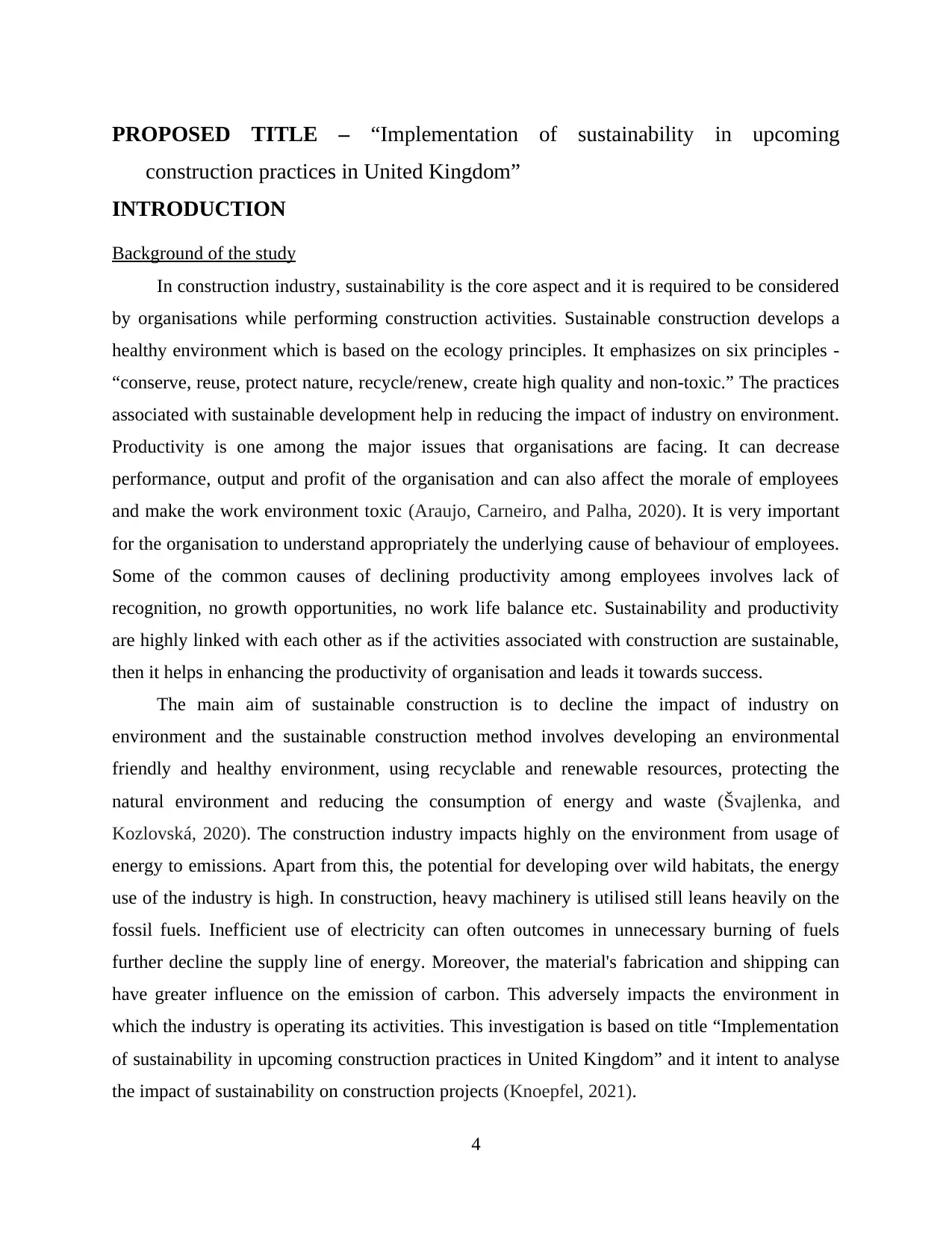
PROPOSED TITLE – “Implementation of sustainability in upcoming
construction practices in United Kingdom”
INTRODUCTION
Background of the study
In construction industry, sustainability is the core aspect and it is required to be considered
by organisations while performing construction activities. Sustainable construction develops a
healthy environment which is based on the ecology principles. It emphasizes on six principles -
“conserve, reuse, protect nature, recycle/renew, create high quality and non-toxic.” The practices
associated with sustainable development help in reducing the impact of industry on environment.
Productivity is one among the major issues that organisations are facing. It can decrease
performance, output and profit of the organisation and can also affect the morale of employees
and make the work environment toxic (Araujo, Carneiro, and Palha, 2020). It is very important
for the organisation to understand appropriately the underlying cause of behaviour of employees.
Some of the common causes of declining productivity among employees involves lack of
recognition, no growth opportunities, no work life balance etc. Sustainability and productivity
are highly linked with each other as if the activities associated with construction are sustainable,
then it helps in enhancing the productivity of organisation and leads it towards success.
The main aim of sustainable construction is to decline the impact of industry on
environment and the sustainable construction method involves developing an environmental
friendly and healthy environment, using recyclable and renewable resources, protecting the
natural environment and reducing the consumption of energy and waste (Švajlenka, and
Kozlovská, 2020). The construction industry impacts highly on the environment from usage of
energy to emissions. Apart from this, the potential for developing over wild habitats, the energy
use of the industry is high. In construction, heavy machinery is utilised still leans heavily on the
fossil fuels. Inefficient use of electricity can often outcomes in unnecessary burning of fuels
further decline the supply line of energy. Moreover, the material's fabrication and shipping can
have greater influence on the emission of carbon. This adversely impacts the environment in
which the industry is operating its activities. This investigation is based on title “Implementation
of sustainability in upcoming construction practices in United Kingdom” and it intent to analyse
the impact of sustainability on construction projects (Knoepfel, 2021).
4
construction practices in United Kingdom”
INTRODUCTION
Background of the study
In construction industry, sustainability is the core aspect and it is required to be considered
by organisations while performing construction activities. Sustainable construction develops a
healthy environment which is based on the ecology principles. It emphasizes on six principles -
“conserve, reuse, protect nature, recycle/renew, create high quality and non-toxic.” The practices
associated with sustainable development help in reducing the impact of industry on environment.
Productivity is one among the major issues that organisations are facing. It can decrease
performance, output and profit of the organisation and can also affect the morale of employees
and make the work environment toxic (Araujo, Carneiro, and Palha, 2020). It is very important
for the organisation to understand appropriately the underlying cause of behaviour of employees.
Some of the common causes of declining productivity among employees involves lack of
recognition, no growth opportunities, no work life balance etc. Sustainability and productivity
are highly linked with each other as if the activities associated with construction are sustainable,
then it helps in enhancing the productivity of organisation and leads it towards success.
The main aim of sustainable construction is to decline the impact of industry on
environment and the sustainable construction method involves developing an environmental
friendly and healthy environment, using recyclable and renewable resources, protecting the
natural environment and reducing the consumption of energy and waste (Švajlenka, and
Kozlovská, 2020). The construction industry impacts highly on the environment from usage of
energy to emissions. Apart from this, the potential for developing over wild habitats, the energy
use of the industry is high. In construction, heavy machinery is utilised still leans heavily on the
fossil fuels. Inefficient use of electricity can often outcomes in unnecessary burning of fuels
further decline the supply line of energy. Moreover, the material's fabrication and shipping can
have greater influence on the emission of carbon. This adversely impacts the environment in
which the industry is operating its activities. This investigation is based on title “Implementation
of sustainability in upcoming construction practices in United Kingdom” and it intent to analyse
the impact of sustainability on construction projects (Knoepfel, 2021).
4
Paraphrase This Document
Need a fresh take? Get an instant paraphrase of this document with our AI Paraphraser
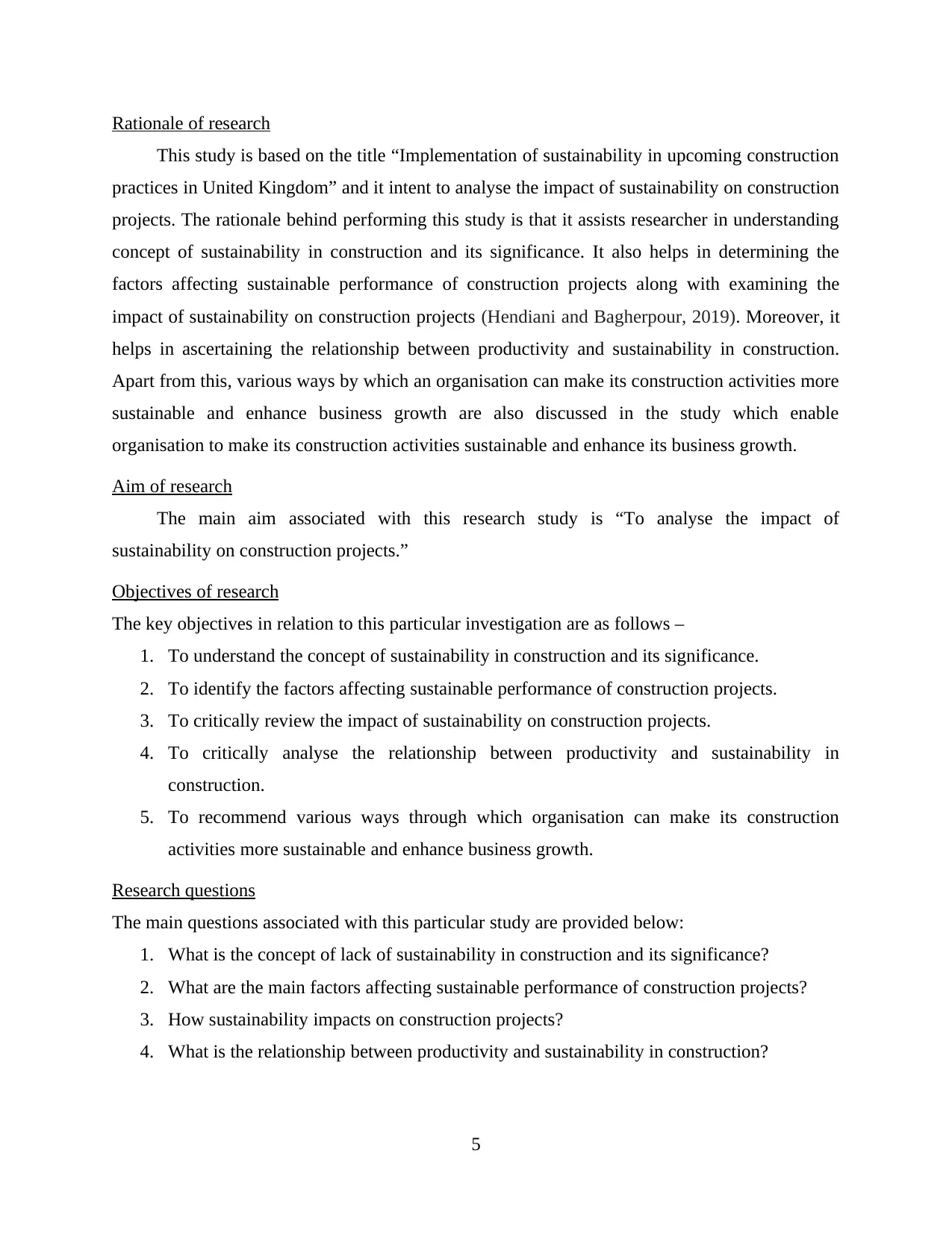
Rationale of research
This study is based on the title “Implementation of sustainability in upcoming construction
practices in United Kingdom” and it intent to analyse the impact of sustainability on construction
projects. The rationale behind performing this study is that it assists researcher in understanding
concept of sustainability in construction and its significance. It also helps in determining the
factors affecting sustainable performance of construction projects along with examining the
impact of sustainability on construction projects (Hendiani and Bagherpour, 2019). Moreover, it
helps in ascertaining the relationship between productivity and sustainability in construction.
Apart from this, various ways by which an organisation can make its construction activities more
sustainable and enhance business growth are also discussed in the study which enable
organisation to make its construction activities sustainable and enhance its business growth.
Aim of research
The main aim associated with this research study is “To analyse the impact of
sustainability on construction projects.”
Objectives of research
The key objectives in relation to this particular investigation are as follows –
1. To understand the concept of sustainability in construction and its significance.
2. To identify the factors affecting sustainable performance of construction projects.
3. To critically review the impact of sustainability on construction projects.
4. To critically analyse the relationship between productivity and sustainability in
construction.
5. To recommend various ways through which organisation can make its construction
activities more sustainable and enhance business growth.
Research questions
The main questions associated with this particular study are provided below:
1. What is the concept of lack of sustainability in construction and its significance?
2. What are the main factors affecting sustainable performance of construction projects?
3. How sustainability impacts on construction projects?
4. What is the relationship between productivity and sustainability in construction?
5
This study is based on the title “Implementation of sustainability in upcoming construction
practices in United Kingdom” and it intent to analyse the impact of sustainability on construction
projects. The rationale behind performing this study is that it assists researcher in understanding
concept of sustainability in construction and its significance. It also helps in determining the
factors affecting sustainable performance of construction projects along with examining the
impact of sustainability on construction projects (Hendiani and Bagherpour, 2019). Moreover, it
helps in ascertaining the relationship between productivity and sustainability in construction.
Apart from this, various ways by which an organisation can make its construction activities more
sustainable and enhance business growth are also discussed in the study which enable
organisation to make its construction activities sustainable and enhance its business growth.
Aim of research
The main aim associated with this research study is “To analyse the impact of
sustainability on construction projects.”
Objectives of research
The key objectives in relation to this particular investigation are as follows –
1. To understand the concept of sustainability in construction and its significance.
2. To identify the factors affecting sustainable performance of construction projects.
3. To critically review the impact of sustainability on construction projects.
4. To critically analyse the relationship between productivity and sustainability in
construction.
5. To recommend various ways through which organisation can make its construction
activities more sustainable and enhance business growth.
Research questions
The main questions associated with this particular study are provided below:
1. What is the concept of lack of sustainability in construction and its significance?
2. What are the main factors affecting sustainable performance of construction projects?
3. How sustainability impacts on construction projects?
4. What is the relationship between productivity and sustainability in construction?
5
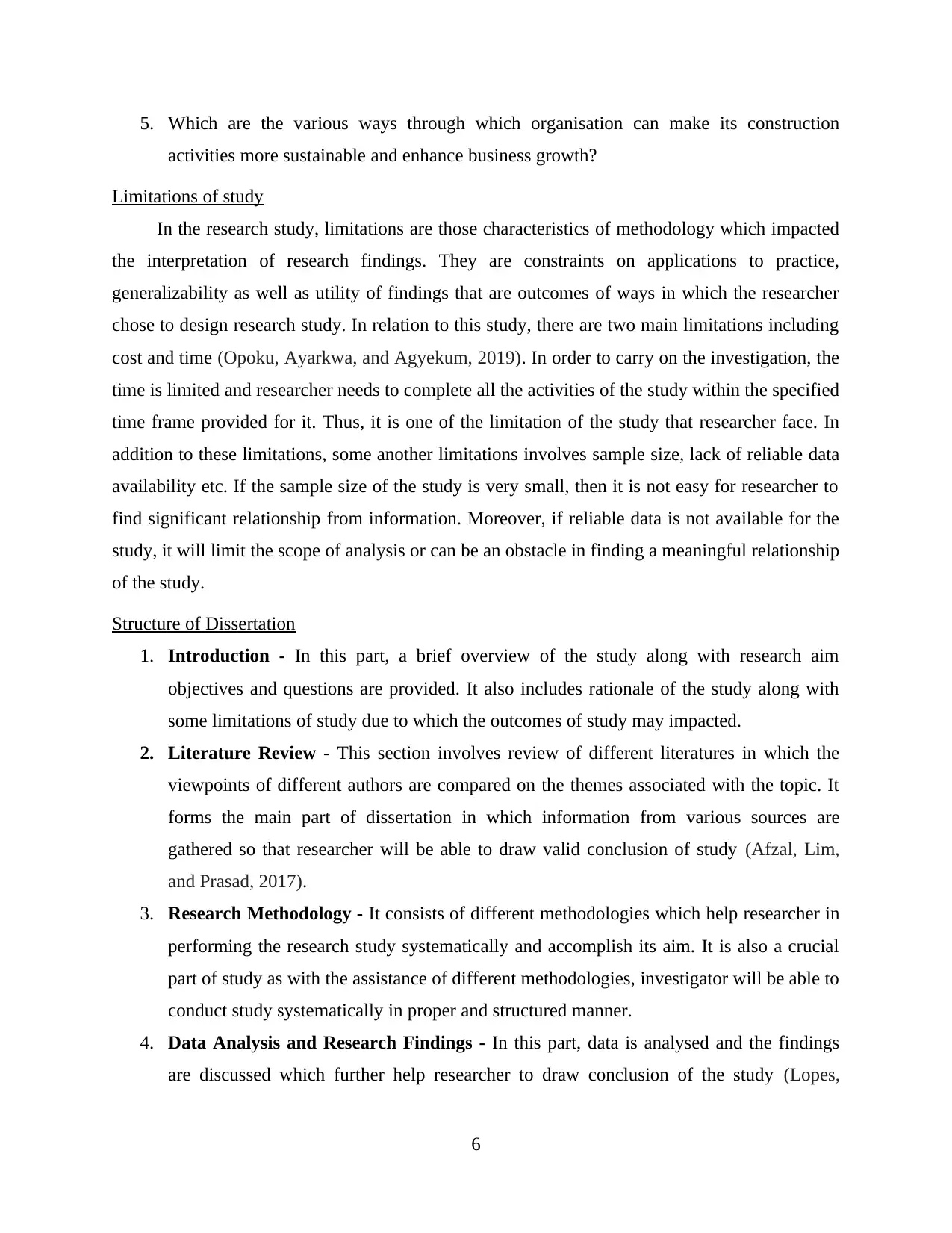
5. Which are the various ways through which organisation can make its construction
activities more sustainable and enhance business growth?
Limitations of study
In the research study, limitations are those characteristics of methodology which impacted
the interpretation of research findings. They are constraints on applications to practice,
generalizability as well as utility of findings that are outcomes of ways in which the researcher
chose to design research study. In relation to this study, there are two main limitations including
cost and time (Opoku, Ayarkwa, and Agyekum, 2019). In order to carry on the investigation, the
time is limited and researcher needs to complete all the activities of the study within the specified
time frame provided for it. Thus, it is one of the limitation of the study that researcher face. In
addition to these limitations, some another limitations involves sample size, lack of reliable data
availability etc. If the sample size of the study is very small, then it is not easy for researcher to
find significant relationship from information. Moreover, if reliable data is not available for the
study, it will limit the scope of analysis or can be an obstacle in finding a meaningful relationship
of the study.
Structure of Dissertation
1. Introduction - In this part, a brief overview of the study along with research aim
objectives and questions are provided. It also includes rationale of the study along with
some limitations of study due to which the outcomes of study may impacted.
2. Literature Review - This section involves review of different literatures in which the
viewpoints of different authors are compared on the themes associated with the topic. It
forms the main part of dissertation in which information from various sources are
gathered so that researcher will be able to draw valid conclusion of study (Afzal, Lim,
and Prasad, 2017).
3. Research Methodology - It consists of different methodologies which help researcher in
performing the research study systematically and accomplish its aim. It is also a crucial
part of study as with the assistance of different methodologies, investigator will be able to
conduct study systematically in proper and structured manner.
4. Data Analysis and Research Findings - In this part, data is analysed and the findings
are discussed which further help researcher to draw conclusion of the study (Lopes,
6
activities more sustainable and enhance business growth?
Limitations of study
In the research study, limitations are those characteristics of methodology which impacted
the interpretation of research findings. They are constraints on applications to practice,
generalizability as well as utility of findings that are outcomes of ways in which the researcher
chose to design research study. In relation to this study, there are two main limitations including
cost and time (Opoku, Ayarkwa, and Agyekum, 2019). In order to carry on the investigation, the
time is limited and researcher needs to complete all the activities of the study within the specified
time frame provided for it. Thus, it is one of the limitation of the study that researcher face. In
addition to these limitations, some another limitations involves sample size, lack of reliable data
availability etc. If the sample size of the study is very small, then it is not easy for researcher to
find significant relationship from information. Moreover, if reliable data is not available for the
study, it will limit the scope of analysis or can be an obstacle in finding a meaningful relationship
of the study.
Structure of Dissertation
1. Introduction - In this part, a brief overview of the study along with research aim
objectives and questions are provided. It also includes rationale of the study along with
some limitations of study due to which the outcomes of study may impacted.
2. Literature Review - This section involves review of different literatures in which the
viewpoints of different authors are compared on the themes associated with the topic. It
forms the main part of dissertation in which information from various sources are
gathered so that researcher will be able to draw valid conclusion of study (Afzal, Lim,
and Prasad, 2017).
3. Research Methodology - It consists of different methodologies which help researcher in
performing the research study systematically and accomplish its aim. It is also a crucial
part of study as with the assistance of different methodologies, investigator will be able to
conduct study systematically in proper and structured manner.
4. Data Analysis and Research Findings - In this part, data is analysed and the findings
are discussed which further help researcher to draw conclusion of the study (Lopes,
6
⊘ This is a preview!⊘
Do you want full access?
Subscribe today to unlock all pages.

Trusted by 1+ million students worldwide
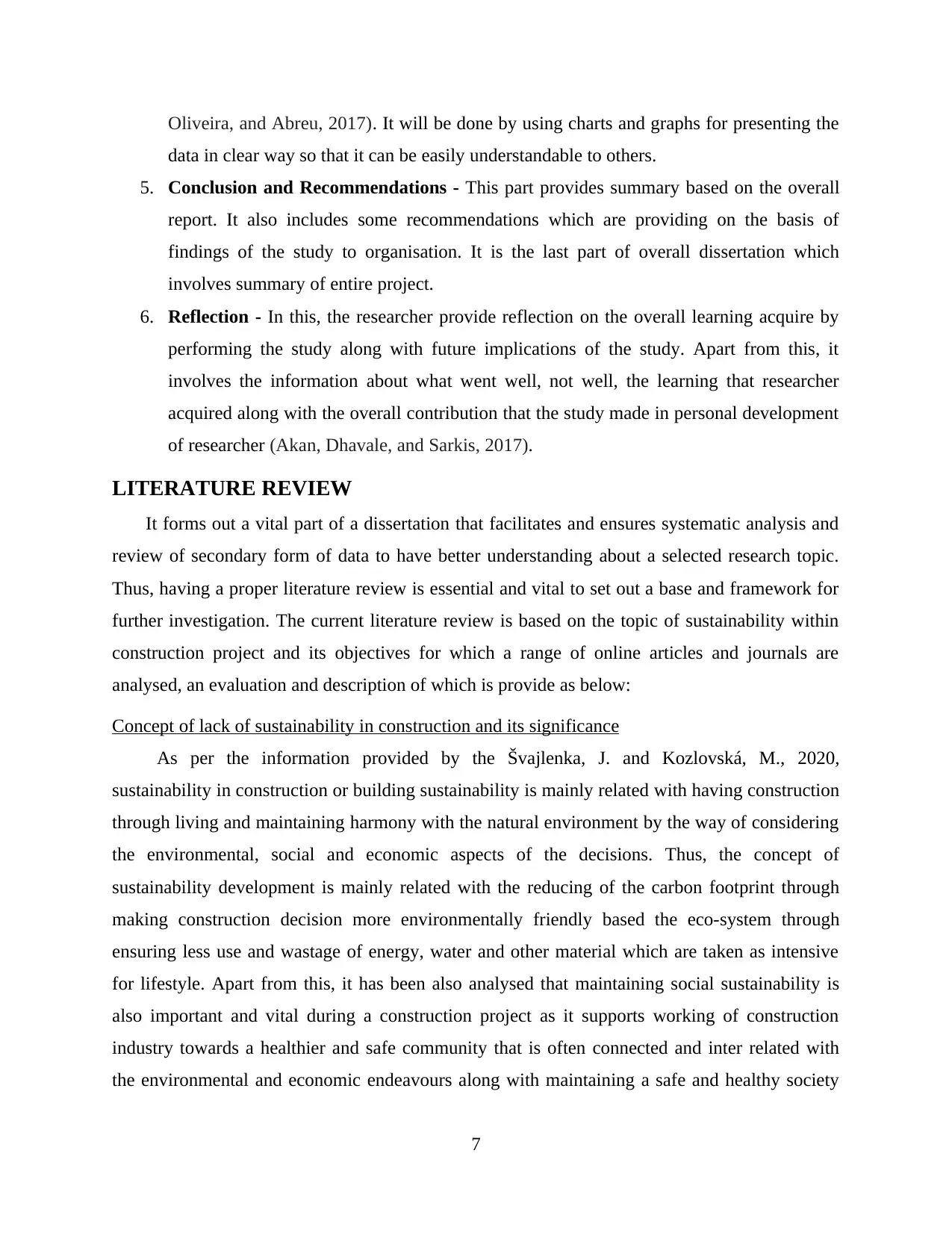
Oliveira, and Abreu, 2017). It will be done by using charts and graphs for presenting the
data in clear way so that it can be easily understandable to others.
5. Conclusion and Recommendations - This part provides summary based on the overall
report. It also includes some recommendations which are providing on the basis of
findings of the study to organisation. It is the last part of overall dissertation which
involves summary of entire project.
6. Reflection - In this, the researcher provide reflection on the overall learning acquire by
performing the study along with future implications of the study. Apart from this, it
involves the information about what went well, not well, the learning that researcher
acquired along with the overall contribution that the study made in personal development
of researcher (Akan, Dhavale, and Sarkis, 2017).
LITERATURE REVIEW
It forms out a vital part of a dissertation that facilitates and ensures systematic analysis and
review of secondary form of data to have better understanding about a selected research topic.
Thus, having a proper literature review is essential and vital to set out a base and framework for
further investigation. The current literature review is based on the topic of sustainability within
construction project and its objectives for which a range of online articles and journals are
analysed, an evaluation and description of which is provide as below:
Concept of lack of sustainability in construction and its significance
As per the information provided by the Švajlenka, J. and Kozlovská, M., 2020,
sustainability in construction or building sustainability is mainly related with having construction
through living and maintaining harmony with the natural environment by the way of considering
the environmental, social and economic aspects of the decisions. Thus, the concept of
sustainability development is mainly related with the reducing of the carbon footprint through
making construction decision more environmentally friendly based the eco-system through
ensuring less use and wastage of energy, water and other material which are taken as intensive
for lifestyle. Apart from this, it has been also analysed that maintaining social sustainability is
also important and vital during a construction project as it supports working of construction
industry towards a healthier and safe community that is often connected and inter related with
the environmental and economic endeavours along with maintaining a safe and healthy society
7
data in clear way so that it can be easily understandable to others.
5. Conclusion and Recommendations - This part provides summary based on the overall
report. It also includes some recommendations which are providing on the basis of
findings of the study to organisation. It is the last part of overall dissertation which
involves summary of entire project.
6. Reflection - In this, the researcher provide reflection on the overall learning acquire by
performing the study along with future implications of the study. Apart from this, it
involves the information about what went well, not well, the learning that researcher
acquired along with the overall contribution that the study made in personal development
of researcher (Akan, Dhavale, and Sarkis, 2017).
LITERATURE REVIEW
It forms out a vital part of a dissertation that facilitates and ensures systematic analysis and
review of secondary form of data to have better understanding about a selected research topic.
Thus, having a proper literature review is essential and vital to set out a base and framework for
further investigation. The current literature review is based on the topic of sustainability within
construction project and its objectives for which a range of online articles and journals are
analysed, an evaluation and description of which is provide as below:
Concept of lack of sustainability in construction and its significance
As per the information provided by the Švajlenka, J. and Kozlovská, M., 2020,
sustainability in construction or building sustainability is mainly related with having construction
through living and maintaining harmony with the natural environment by the way of considering
the environmental, social and economic aspects of the decisions. Thus, the concept of
sustainability development is mainly related with the reducing of the carbon footprint through
making construction decision more environmentally friendly based the eco-system through
ensuring less use and wastage of energy, water and other material which are taken as intensive
for lifestyle. Apart from this, it has been also analysed that maintaining social sustainability is
also important and vital during a construction project as it supports working of construction
industry towards a healthier and safe community that is often connected and inter related with
the environmental and economic endeavours along with maintaining a safe and healthy society
7
Paraphrase This Document
Need a fresh take? Get an instant paraphrase of this document with our AI Paraphraser
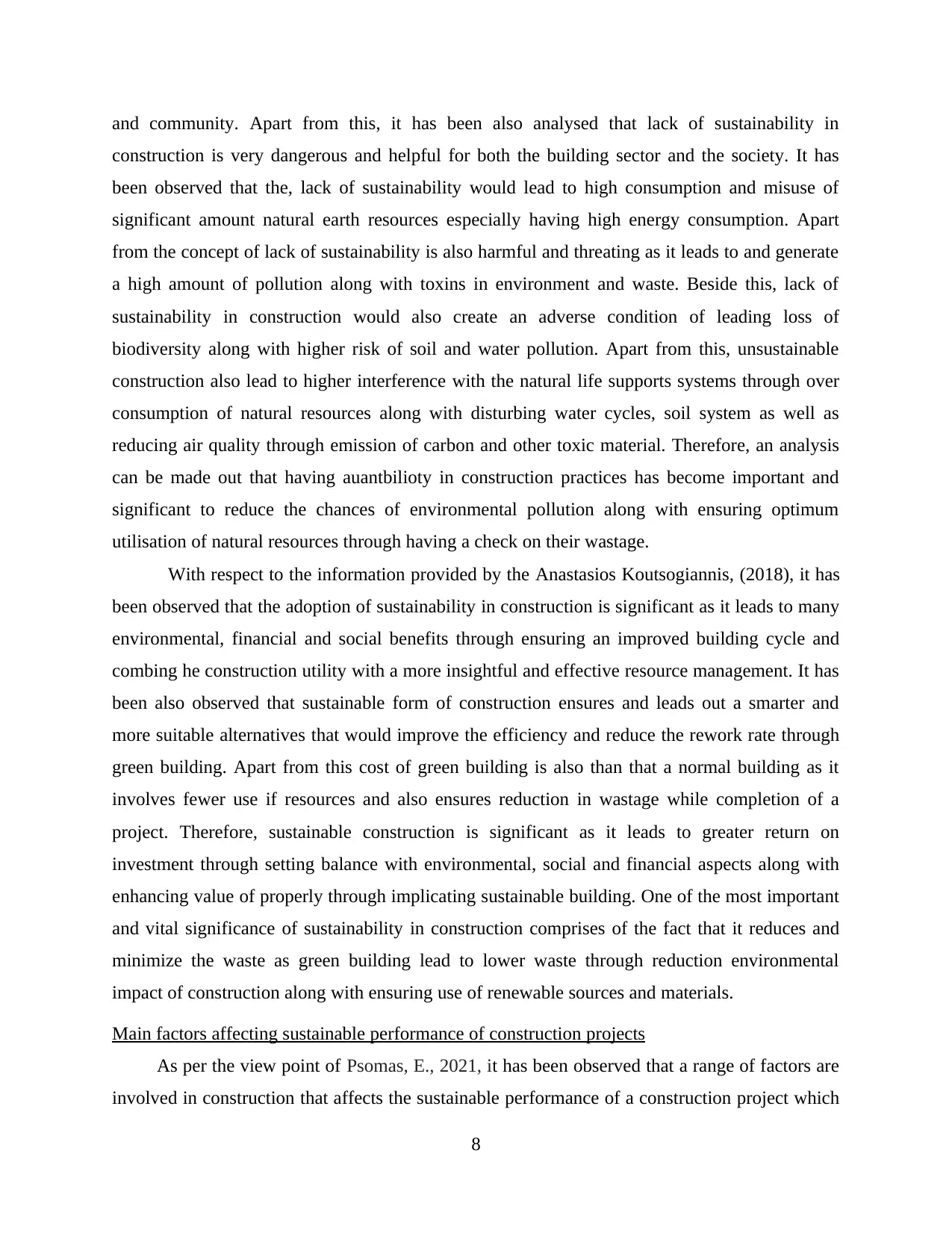
and community. Apart from this, it has been also analysed that lack of sustainability in
construction is very dangerous and helpful for both the building sector and the society. It has
been observed that the, lack of sustainability would lead to high consumption and misuse of
significant amount natural earth resources especially having high energy consumption. Apart
from the concept of lack of sustainability is also harmful and threating as it leads to and generate
a high amount of pollution along with toxins in environment and waste. Beside this, lack of
sustainability in construction would also create an adverse condition of leading loss of
biodiversity along with higher risk of soil and water pollution. Apart from this, unsustainable
construction also lead to higher interference with the natural life supports systems through over
consumption of natural resources along with disturbing water cycles, soil system as well as
reducing air quality through emission of carbon and other toxic material. Therefore, an analysis
can be made out that having auantbilioty in construction practices has become important and
significant to reduce the chances of environmental pollution along with ensuring optimum
utilisation of natural resources through having a check on their wastage.
With respect to the information provided by the Anastasios Koutsogiannis, (2018), it has
been observed that the adoption of sustainability in construction is significant as it leads to many
environmental, financial and social benefits through ensuring an improved building cycle and
combing he construction utility with a more insightful and effective resource management. It has
been also observed that sustainable form of construction ensures and leads out a smarter and
more suitable alternatives that would improve the efficiency and reduce the rework rate through
green building. Apart from this cost of green building is also than that a normal building as it
involves fewer use if resources and also ensures reduction in wastage while completion of a
project. Therefore, sustainable construction is significant as it leads to greater return on
investment through setting balance with environmental, social and financial aspects along with
enhancing value of properly through implicating sustainable building. One of the most important
and vital significance of sustainability in construction comprises of the fact that it reduces and
minimize the waste as green building lead to lower waste through reduction environmental
impact of construction along with ensuring use of renewable sources and materials.
Main factors affecting sustainable performance of construction projects
As per the view point of Psomas, E., 2021, it has been observed that a range of factors are
involved in construction that affects the sustainable performance of a construction project which
8
construction is very dangerous and helpful for both the building sector and the society. It has
been observed that the, lack of sustainability would lead to high consumption and misuse of
significant amount natural earth resources especially having high energy consumption. Apart
from the concept of lack of sustainability is also harmful and threating as it leads to and generate
a high amount of pollution along with toxins in environment and waste. Beside this, lack of
sustainability in construction would also create an adverse condition of leading loss of
biodiversity along with higher risk of soil and water pollution. Apart from this, unsustainable
construction also lead to higher interference with the natural life supports systems through over
consumption of natural resources along with disturbing water cycles, soil system as well as
reducing air quality through emission of carbon and other toxic material. Therefore, an analysis
can be made out that having auantbilioty in construction practices has become important and
significant to reduce the chances of environmental pollution along with ensuring optimum
utilisation of natural resources through having a check on their wastage.
With respect to the information provided by the Anastasios Koutsogiannis, (2018), it has
been observed that the adoption of sustainability in construction is significant as it leads to many
environmental, financial and social benefits through ensuring an improved building cycle and
combing he construction utility with a more insightful and effective resource management. It has
been also observed that sustainable form of construction ensures and leads out a smarter and
more suitable alternatives that would improve the efficiency and reduce the rework rate through
green building. Apart from this cost of green building is also than that a normal building as it
involves fewer use if resources and also ensures reduction in wastage while completion of a
project. Therefore, sustainable construction is significant as it leads to greater return on
investment through setting balance with environmental, social and financial aspects along with
enhancing value of properly through implicating sustainable building. One of the most important
and vital significance of sustainability in construction comprises of the fact that it reduces and
minimize the waste as green building lead to lower waste through reduction environmental
impact of construction along with ensuring use of renewable sources and materials.
Main factors affecting sustainable performance of construction projects
As per the view point of Psomas, E., 2021, it has been observed that a range of factors are
involved in construction that affects the sustainable performance of a construction project which
8
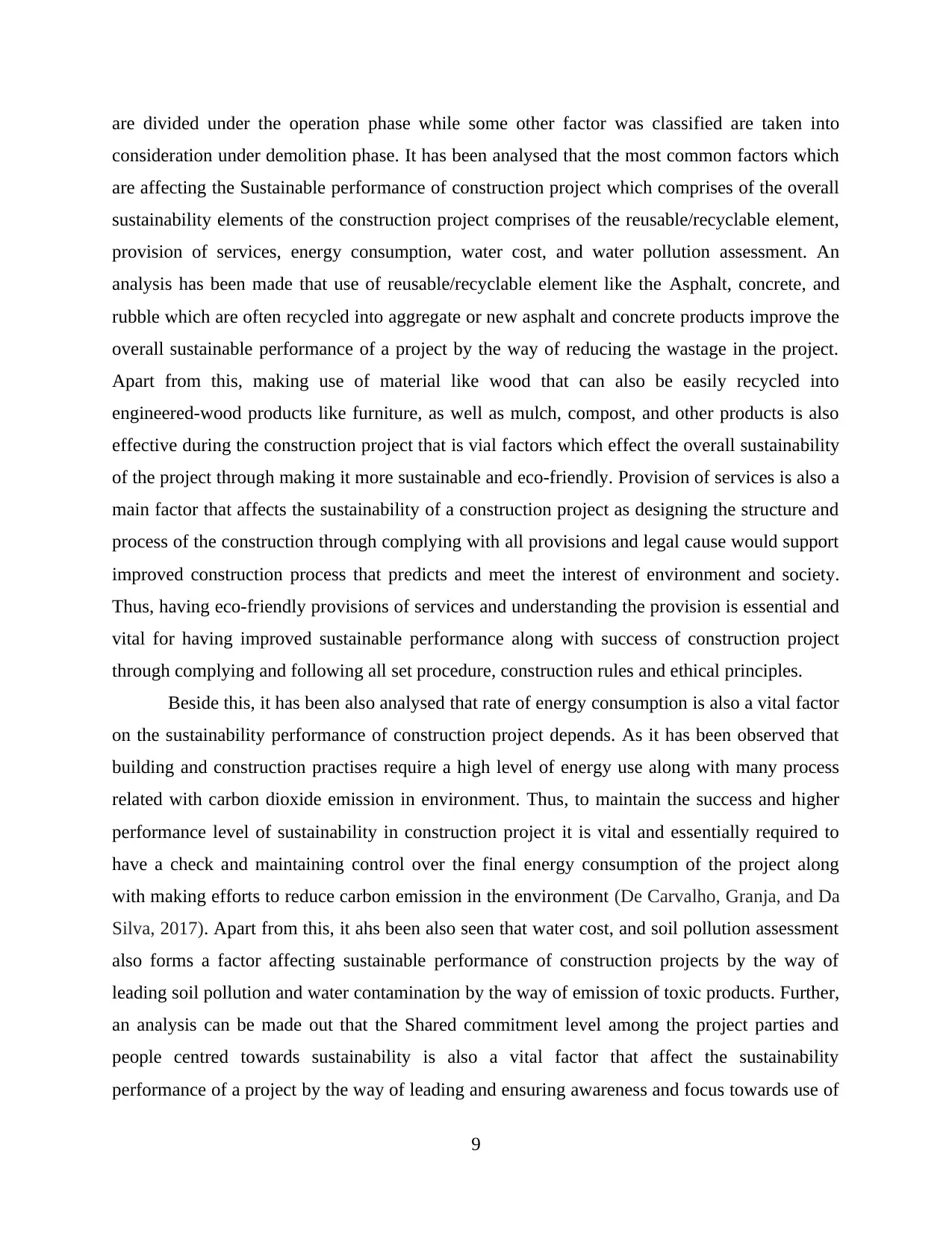
are divided under the operation phase while some other factor was classified are taken into
consideration under demolition phase. It has been analysed that the most common factors which
are affecting the Sustainable performance of construction project which comprises of the overall
sustainability elements of the construction project comprises of the reusable/recyclable element,
provision of services, energy consumption, water cost, and water pollution assessment. An
analysis has been made that use of reusable/recyclable element like the Asphalt, concrete, and
rubble which are often recycled into aggregate or new asphalt and concrete products improve the
overall sustainable performance of a project by the way of reducing the wastage in the project.
Apart from this, making use of material like wood that can also be easily recycled into
engineered-wood products like furniture, as well as mulch, compost, and other products is also
effective during the construction project that is vial factors which effect the overall sustainability
of the project through making it more sustainable and eco-friendly. Provision of services is also a
main factor that affects the sustainability of a construction project as designing the structure and
process of the construction through complying with all provisions and legal cause would support
improved construction process that predicts and meet the interest of environment and society.
Thus, having eco-friendly provisions of services and understanding the provision is essential and
vital for having improved sustainable performance along with success of construction project
through complying and following all set procedure, construction rules and ethical principles.
Beside this, it has been also analysed that rate of energy consumption is also a vital factor
on the sustainability performance of construction project depends. As it has been observed that
building and construction practises require a high level of energy use along with many process
related with carbon dioxide emission in environment. Thus, to maintain the success and higher
performance level of sustainability in construction project it is vital and essentially required to
have a check and maintaining control over the final energy consumption of the project along
with making efforts to reduce carbon emission in the environment (De Carvalho, Granja, and Da
Silva, 2017). Apart from this, it ahs been also seen that water cost, and soil pollution assessment
also forms a factor affecting sustainable performance of construction projects by the way of
leading soil pollution and water contamination by the way of emission of toxic products. Further,
an analysis can be made out that the Shared commitment level among the project parties and
people centred towards sustainability is also a vital factor that affect the sustainability
performance of a project by the way of leading and ensuring awareness and focus towards use of
9
consideration under demolition phase. It has been analysed that the most common factors which
are affecting the Sustainable performance of construction project which comprises of the overall
sustainability elements of the construction project comprises of the reusable/recyclable element,
provision of services, energy consumption, water cost, and water pollution assessment. An
analysis has been made that use of reusable/recyclable element like the Asphalt, concrete, and
rubble which are often recycled into aggregate or new asphalt and concrete products improve the
overall sustainable performance of a project by the way of reducing the wastage in the project.
Apart from this, making use of material like wood that can also be easily recycled into
engineered-wood products like furniture, as well as mulch, compost, and other products is also
effective during the construction project that is vial factors which effect the overall sustainability
of the project through making it more sustainable and eco-friendly. Provision of services is also a
main factor that affects the sustainability of a construction project as designing the structure and
process of the construction through complying with all provisions and legal cause would support
improved construction process that predicts and meet the interest of environment and society.
Thus, having eco-friendly provisions of services and understanding the provision is essential and
vital for having improved sustainable performance along with success of construction project
through complying and following all set procedure, construction rules and ethical principles.
Beside this, it has been also analysed that rate of energy consumption is also a vital factor
on the sustainability performance of construction project depends. As it has been observed that
building and construction practises require a high level of energy use along with many process
related with carbon dioxide emission in environment. Thus, to maintain the success and higher
performance level of sustainability in construction project it is vital and essentially required to
have a check and maintaining control over the final energy consumption of the project along
with making efforts to reduce carbon emission in the environment (De Carvalho, Granja, and Da
Silva, 2017). Apart from this, it ahs been also seen that water cost, and soil pollution assessment
also forms a factor affecting sustainable performance of construction projects by the way of
leading soil pollution and water contamination by the way of emission of toxic products. Further,
an analysis can be made out that the Shared commitment level among the project parties and
people centred towards sustainability is also a vital factor that affect the sustainability
performance of a project by the way of leading and ensuring awareness and focus towards use of
9
⊘ This is a preview!⊘
Do you want full access?
Subscribe today to unlock all pages.

Trusted by 1+ million students worldwide
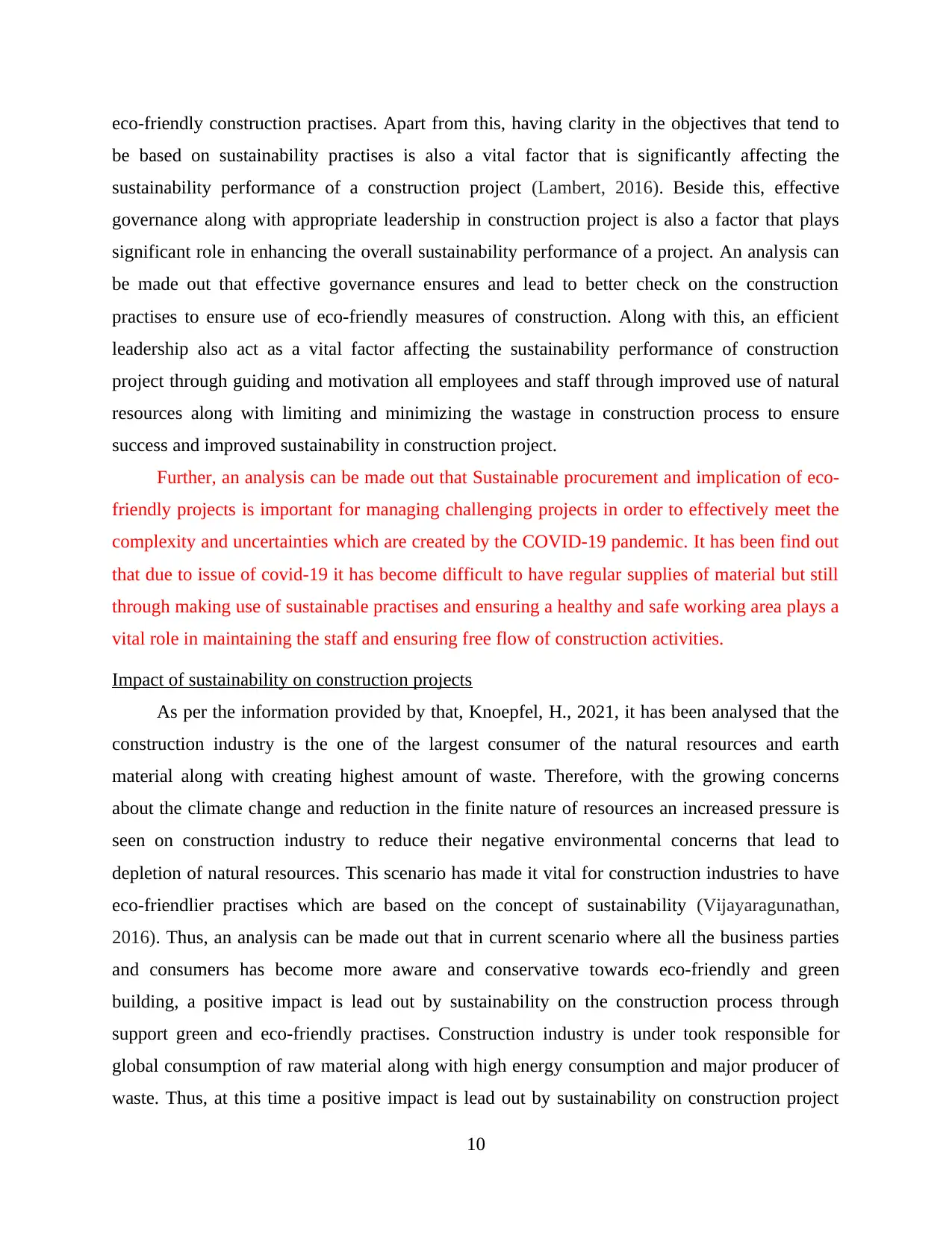
eco-friendly construction practises. Apart from this, having clarity in the objectives that tend to
be based on sustainability practises is also a vital factor that is significantly affecting the
sustainability performance of a construction project (Lambert, 2016). Beside this, effective
governance along with appropriate leadership in construction project is also a factor that plays
significant role in enhancing the overall sustainability performance of a project. An analysis can
be made out that effective governance ensures and lead to better check on the construction
practises to ensure use of eco-friendly measures of construction. Along with this, an efficient
leadership also act as a vital factor affecting the sustainability performance of construction
project through guiding and motivation all employees and staff through improved use of natural
resources along with limiting and minimizing the wastage in construction process to ensure
success and improved sustainability in construction project.
Further, an analysis can be made out that Sustainable procurement and implication of eco-
friendly projects is important for managing challenging projects in order to effectively meet the
complexity and uncertainties which are created by the COVID-19 pandemic. It has been find out
that due to issue of covid-19 it has become difficult to have regular supplies of material but still
through making use of sustainable practises and ensuring a healthy and safe working area plays a
vital role in maintaining the staff and ensuring free flow of construction activities.
Impact of sustainability on construction projects
As per the information provided by that, Knoepfel, H., 2021, it has been analysed that the
construction industry is the one of the largest consumer of the natural resources and earth
material along with creating highest amount of waste. Therefore, with the growing concerns
about the climate change and reduction in the finite nature of resources an increased pressure is
seen on construction industry to reduce their negative environmental concerns that lead to
depletion of natural resources. This scenario has made it vital for construction industries to have
eco-friendlier practises which are based on the concept of sustainability (Vijayaragunathan,
2016). Thus, an analysis can be made out that in current scenario where all the business parties
and consumers has become more aware and conservative towards eco-friendly and green
building, a positive impact is lead out by sustainability on the construction process through
support green and eco-friendly practises. Construction industry is under took responsible for
global consumption of raw material along with high energy consumption and major producer of
waste. Thus, at this time a positive impact is lead out by sustainability on construction project
10
be based on sustainability practises is also a vital factor that is significantly affecting the
sustainability performance of a construction project (Lambert, 2016). Beside this, effective
governance along with appropriate leadership in construction project is also a factor that plays
significant role in enhancing the overall sustainability performance of a project. An analysis can
be made out that effective governance ensures and lead to better check on the construction
practises to ensure use of eco-friendly measures of construction. Along with this, an efficient
leadership also act as a vital factor affecting the sustainability performance of construction
project through guiding and motivation all employees and staff through improved use of natural
resources along with limiting and minimizing the wastage in construction process to ensure
success and improved sustainability in construction project.
Further, an analysis can be made out that Sustainable procurement and implication of eco-
friendly projects is important for managing challenging projects in order to effectively meet the
complexity and uncertainties which are created by the COVID-19 pandemic. It has been find out
that due to issue of covid-19 it has become difficult to have regular supplies of material but still
through making use of sustainable practises and ensuring a healthy and safe working area plays a
vital role in maintaining the staff and ensuring free flow of construction activities.
Impact of sustainability on construction projects
As per the information provided by that, Knoepfel, H., 2021, it has been analysed that the
construction industry is the one of the largest consumer of the natural resources and earth
material along with creating highest amount of waste. Therefore, with the growing concerns
about the climate change and reduction in the finite nature of resources an increased pressure is
seen on construction industry to reduce their negative environmental concerns that lead to
depletion of natural resources. This scenario has made it vital for construction industries to have
eco-friendlier practises which are based on the concept of sustainability (Vijayaragunathan,
2016). Thus, an analysis can be made out that in current scenario where all the business parties
and consumers has become more aware and conservative towards eco-friendly and green
building, a positive impact is lead out by sustainability on the construction process through
support green and eco-friendly practises. Construction industry is under took responsible for
global consumption of raw material along with high energy consumption and major producer of
waste. Thus, at this time a positive impact is lead out by sustainability on construction project
10
Paraphrase This Document
Need a fresh take? Get an instant paraphrase of this document with our AI Paraphraser
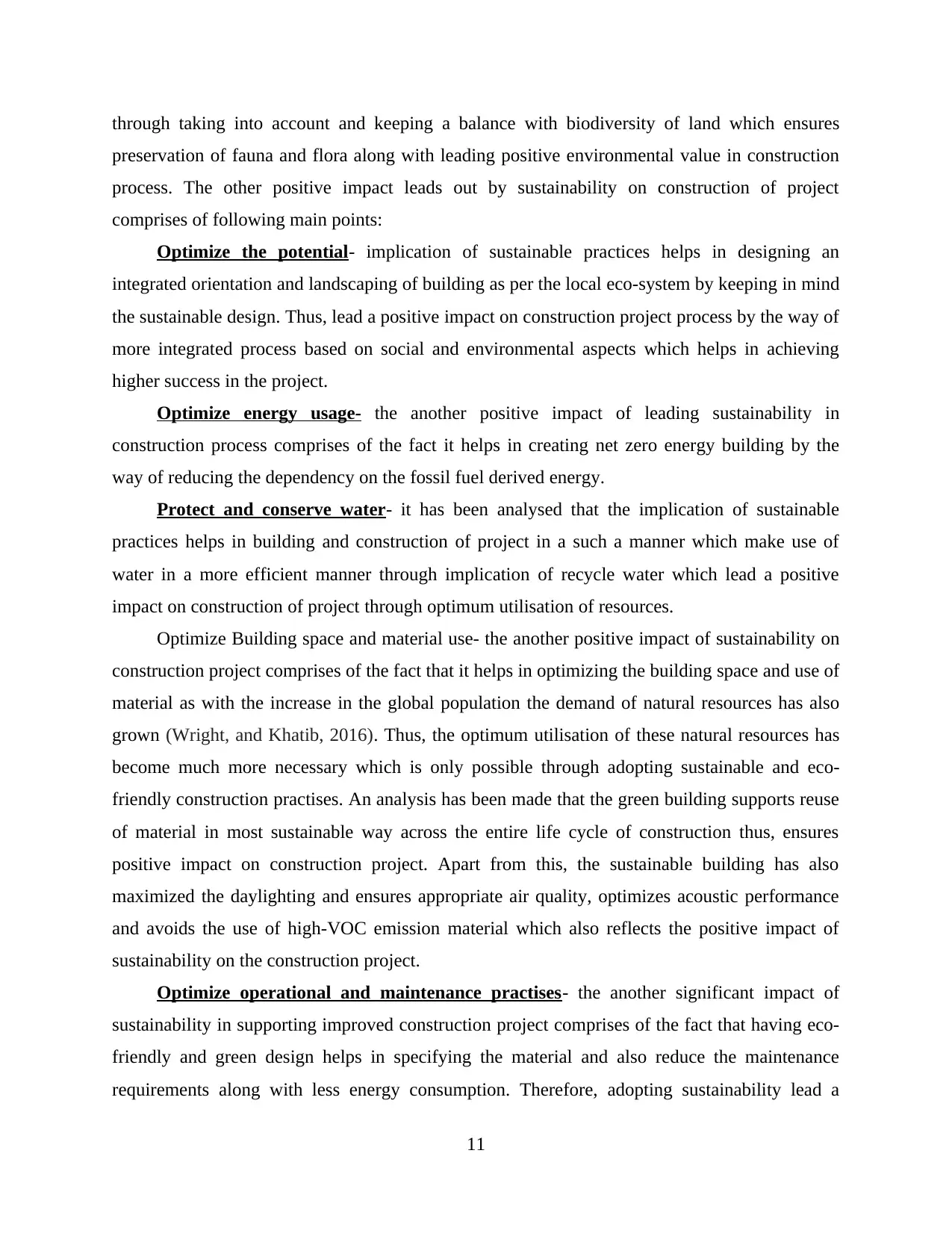
through taking into account and keeping a balance with biodiversity of land which ensures
preservation of fauna and flora along with leading positive environmental value in construction
process. The other positive impact leads out by sustainability on construction of project
comprises of following main points:
Optimize the potential- implication of sustainable practices helps in designing an
integrated orientation and landscaping of building as per the local eco-system by keeping in mind
the sustainable design. Thus, lead a positive impact on construction project process by the way of
more integrated process based on social and environmental aspects which helps in achieving
higher success in the project.
Optimize energy usage- the another positive impact of leading sustainability in
construction process comprises of the fact it helps in creating net zero energy building by the
way of reducing the dependency on the fossil fuel derived energy.
Protect and conserve water- it has been analysed that the implication of sustainable
practices helps in building and construction of project in a such a manner which make use of
water in a more efficient manner through implication of recycle water which lead a positive
impact on construction of project through optimum utilisation of resources.
Optimize Building space and material use- the another positive impact of sustainability on
construction project comprises of the fact that it helps in optimizing the building space and use of
material as with the increase in the global population the demand of natural resources has also
grown (Wright, and Khatib, 2016). Thus, the optimum utilisation of these natural resources has
become much more necessary which is only possible through adopting sustainable and eco-
friendly construction practises. An analysis has been made that the green building supports reuse
of material in most sustainable way across the entire life cycle of construction thus, ensures
positive impact on construction project. Apart from this, the sustainable building has also
maximized the daylighting and ensures appropriate air quality, optimizes acoustic performance
and avoids the use of high-VOC emission material which also reflects the positive impact of
sustainability on the construction project.
Optimize operational and maintenance practises- the another significant impact of
sustainability in supporting improved construction project comprises of the fact that having eco-
friendly and green design helps in specifying the material and also reduce the maintenance
requirements along with less energy consumption. Therefore, adopting sustainability lead a
11
preservation of fauna and flora along with leading positive environmental value in construction
process. The other positive impact leads out by sustainability on construction of project
comprises of following main points:
Optimize the potential- implication of sustainable practices helps in designing an
integrated orientation and landscaping of building as per the local eco-system by keeping in mind
the sustainable design. Thus, lead a positive impact on construction project process by the way of
more integrated process based on social and environmental aspects which helps in achieving
higher success in the project.
Optimize energy usage- the another positive impact of leading sustainability in
construction process comprises of the fact it helps in creating net zero energy building by the
way of reducing the dependency on the fossil fuel derived energy.
Protect and conserve water- it has been analysed that the implication of sustainable
practices helps in building and construction of project in a such a manner which make use of
water in a more efficient manner through implication of recycle water which lead a positive
impact on construction of project through optimum utilisation of resources.
Optimize Building space and material use- the another positive impact of sustainability on
construction project comprises of the fact that it helps in optimizing the building space and use of
material as with the increase in the global population the demand of natural resources has also
grown (Wright, and Khatib, 2016). Thus, the optimum utilisation of these natural resources has
become much more necessary which is only possible through adopting sustainable and eco-
friendly construction practises. An analysis has been made that the green building supports reuse
of material in most sustainable way across the entire life cycle of construction thus, ensures
positive impact on construction project. Apart from this, the sustainable building has also
maximized the daylighting and ensures appropriate air quality, optimizes acoustic performance
and avoids the use of high-VOC emission material which also reflects the positive impact of
sustainability on the construction project.
Optimize operational and maintenance practises- the another significant impact of
sustainability in supporting improved construction project comprises of the fact that having eco-
friendly and green design helps in specifying the material and also reduce the maintenance
requirements along with less energy consumption. Therefore, adopting sustainability lead a
11
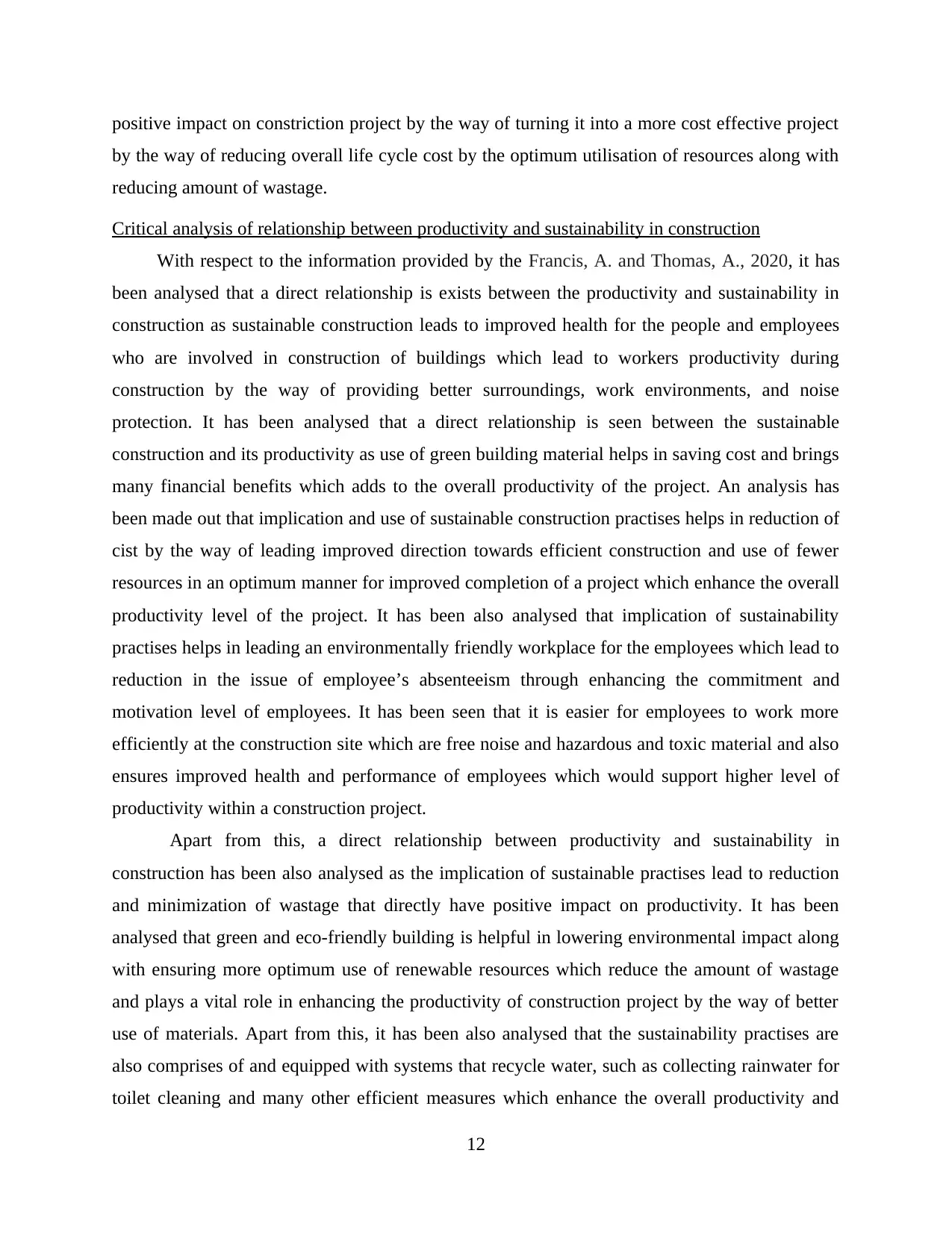
positive impact on constriction project by the way of turning it into a more cost effective project
by the way of reducing overall life cycle cost by the optimum utilisation of resources along with
reducing amount of wastage.
Critical analysis of relationship between productivity and sustainability in construction
With respect to the information provided by the Francis, A. and Thomas, A., 2020, it has
been analysed that a direct relationship is exists between the productivity and sustainability in
construction as sustainable construction leads to improved health for the people and employees
who are involved in construction of buildings which lead to workers productivity during
construction by the way of providing better surroundings, work environments, and noise
protection. It has been analysed that a direct relationship is seen between the sustainable
construction and its productivity as use of green building material helps in saving cost and brings
many financial benefits which adds to the overall productivity of the project. An analysis has
been made out that implication and use of sustainable construction practises helps in reduction of
cist by the way of leading improved direction towards efficient construction and use of fewer
resources in an optimum manner for improved completion of a project which enhance the overall
productivity level of the project. It has been also analysed that implication of sustainability
practises helps in leading an environmentally friendly workplace for the employees which lead to
reduction in the issue of employee’s absenteeism through enhancing the commitment and
motivation level of employees. It has been seen that it is easier for employees to work more
efficiently at the construction site which are free noise and hazardous and toxic material and also
ensures improved health and performance of employees which would support higher level of
productivity within a construction project.
Apart from this, a direct relationship between productivity and sustainability in
construction has been also analysed as the implication of sustainable practises lead to reduction
and minimization of wastage that directly have positive impact on productivity. It has been
analysed that green and eco-friendly building is helpful in lowering environmental impact along
with ensuring more optimum use of renewable resources which reduce the amount of wastage
and plays a vital role in enhancing the productivity of construction project by the way of better
use of materials. Apart from this, it has been also analysed that the sustainability practises are
also comprises of and equipped with systems that recycle water, such as collecting rainwater for
toilet cleaning and many other efficient measures which enhance the overall productivity and
12
by the way of reducing overall life cycle cost by the optimum utilisation of resources along with
reducing amount of wastage.
Critical analysis of relationship between productivity and sustainability in construction
With respect to the information provided by the Francis, A. and Thomas, A., 2020, it has
been analysed that a direct relationship is exists between the productivity and sustainability in
construction as sustainable construction leads to improved health for the people and employees
who are involved in construction of buildings which lead to workers productivity during
construction by the way of providing better surroundings, work environments, and noise
protection. It has been analysed that a direct relationship is seen between the sustainable
construction and its productivity as use of green building material helps in saving cost and brings
many financial benefits which adds to the overall productivity of the project. An analysis has
been made out that implication and use of sustainable construction practises helps in reduction of
cist by the way of leading improved direction towards efficient construction and use of fewer
resources in an optimum manner for improved completion of a project which enhance the overall
productivity level of the project. It has been also analysed that implication of sustainability
practises helps in leading an environmentally friendly workplace for the employees which lead to
reduction in the issue of employee’s absenteeism through enhancing the commitment and
motivation level of employees. It has been seen that it is easier for employees to work more
efficiently at the construction site which are free noise and hazardous and toxic material and also
ensures improved health and performance of employees which would support higher level of
productivity within a construction project.
Apart from this, a direct relationship between productivity and sustainability in
construction has been also analysed as the implication of sustainable practises lead to reduction
and minimization of wastage that directly have positive impact on productivity. It has been
analysed that green and eco-friendly building is helpful in lowering environmental impact along
with ensuring more optimum use of renewable resources which reduce the amount of wastage
and plays a vital role in enhancing the productivity of construction project by the way of better
use of materials. Apart from this, it has been also analysed that the sustainability practises are
also comprises of and equipped with systems that recycle water, such as collecting rainwater for
toilet cleaning and many other efficient measures which enhance the overall productivity and
12
⊘ This is a preview!⊘
Do you want full access?
Subscribe today to unlock all pages.

Trusted by 1+ million students worldwide
1 out of 44
Related Documents
Your All-in-One AI-Powered Toolkit for Academic Success.
+13062052269
info@desklib.com
Available 24*7 on WhatsApp / Email
![[object Object]](/_next/static/media/star-bottom.7253800d.svg)
Unlock your academic potential
Copyright © 2020–2026 A2Z Services. All Rights Reserved. Developed and managed by ZUCOL.




![Report on Solutions to Global Issues: Energy Use - [Course Name]](/_next/image/?url=https%3A%2F%2Fdesklib.com%2Fmedia%2Fimages%2Fiq%2F68676eb4df9840fcacdc201ca9f7c6e0.jpg&w=256&q=75)
